**UPDATE: We will continue to add new bills to this list as they are introduced and have added several since the guide was first published.**
While the Oregon Legislature won’t officially convene until next Tuesday (January 17th), the bills we’ll be talking about in the months to come are now available for perusal. While only a very tiny fraction of bills that are introduced actually become law, it’s worth knowing what gets proposed. If nothing else these bills can give us some hope (or dread), and they reveal something about the lawmaker(s) behind them.
There are several very intriguing bills session. Some are serious, some are less so, but they’re all fair game at this point as the sausage-making machine begins to whir. We’ve flagged bills that would: repeal Oregon’s recent parking reforms, repeal the “Idaho Stop” law, create a statewide bicycle registration program, transfer Powell Blvd from ODOT to the City of Portland, create a tax on EV charging, make “sleeping in a highway danger zone” a traffic violation, and more.
Below is a roundup and brief description of the 24 bills we’ve flagged so far. We will have missed some, so please, if you hear about a bike and/or transportation-related bill, please let us know and we’ll add it to our watch list.
Here’s the list in numerical order:
Senate Joint Resolution (SJR) 2 (Overview)
Sponsor: Sen. Chris Gorsek (D-25)
Official Summary: “Proposes amendment to Oregon Constitution to authorize use of motor vehicle-related tax revenue for infrastructure that reduces traffic burden of, or pollution from, motor vehicles on public roads in this state.”
This is a very exciting proposal that would finally amend Article IX, Section 3a of our state constitution so that money we raise from taxes and fees on cars and trucks can be spent on things other than projects that encourage more use of cars and trucks. The existing restriction wields vast influence over policies and projects and this could be a game-changer. Sen. Gorsek wants the constitutional amendment to be put in front of voters in the 2024 general election.
Senate Bill 301 (Overview)
Sponsor: Sen. Kim Thatcher (R-11)
Official Summary: “Provides that person operating bicycle may not treat stop signs and flashing red lights as yield signs if bicyclist slows bicycle to safe speed.”
Looks as though someone dislikes the “slow, then go” (a.k.a. Idaho Stop) law Oregon passed in 2019 so much they want to repeal it completely. This bill was filed on behalf of a specific person (David Samuel Hill) in what what lawmakers will often call a “constituent bill.” That could mean it’s not much of a priority for Sen. Thatcher and she’s just doing it to satisfy a constituent request. The current law allows bicycle users to treat stop signs and flashing red signals as yield signs, as long as they first slow and make sure there’s no cross traffic. Even though this isn’t likely to make much noise during the session, it’s interesting to see that someone cares enough to make this effort and there’s a lawmaker willing to go along with them.
SB 580 (Overview)
Sponsor: Sen. Floyd Prozanksi (D-4)
Official Summary: “Requires Land Conservation and Development Commission to amend statewide planning goals to address equity, engagement with underserved populations and climate change.”
Back in July, the Oregon Land Conservation and Development Commission voted in what advocates called “the largest rollback of parking mandates in U.S. history.” The new law, that went into effect on January 1st, gives Oregon’s largest cities the ability to develop land without a requirement to include car parking stalls. Supporters of the idea say it’s a way to increase housing supply, and create more climate-friendly communities. But the cities of Springfield, Medford, Hillsboro, Cornelius, Happy Valley, and Troutdale; along with the nonprofit lobby group League of Oregon Cities, isn’t quite ready for the change. They are the entities who’ve asked Sen. Prozanski to delay implementation of the new laws until a host of amendments can be made. Portlanders for Parking Reform leader Tony Jordan has wasted no time sharing his opinion about it: “SB 580 would reinstate hurdles to solving tough problems. Let’s crush it.”
SB 598 (Overview)
Sponsor: Sen. Kathleen Taylor (D-21)
Official Summary: “Transfers jurisdiction of Southeast Powell Boulevard to City of Portland.”
Sen. Taylor has kids who attend Cleveland High School and she was the (highly engaged) emcee of the Powell Blvd Safety Forum held at the high school back in October. The bill would force ODOT and PBOT to hammer out a deal to make the transfer and would cover the stretch of Powell from Southeast 9th Avenue to I-205.
SB 615* (Overview) *Added after guide was first published*
Sponsor: Sen. Chris Gorsek (D-25)
Official Summary: “Modifies crime of organizing speed racing event. Punishes by maximum of 364 days’ imprisonment, $6,250 fine, or both. Punishes second and subsequent convictions within five-year period by maximum of five years’ imprisonment, $125,000 fine, or both. Modifies crime of reckless driving to include activities related to speed racing. Authorizes criminal forfeiture of instrumentalities of crime of reckless driving.”
SB 693 (Overview)
Sponsor: Sen. James Manning (D-7)
Official Summary: “Establishes voluntary bicycle registration program. Sets registration, transfer of ownership, change of address and other fees. Establishes Bicycle Transportation Improvement Fund. Makes bicycle ownership information available to law enforcement agencies.”
Here we go again. Sen. Manning has filed this bill on behalf of a constituent named Zach Mulholland. It’s unclear why he thinks this would be a good idea, but the proposal is to establish a voluntary bicycle registration program run by the State of Oregon. Perhaps Mr. Mulholland thinks this would help with bike theft? Or he thinks it would be a good way to raise money? The bill would require people to pay $12 for a registration certificate, $3 for a serial number, $3 if the registrant changes address, and $6 if the bike transfers ownership. Proposals for mandatory registration have gone down in flames at least twice in the past — once in 2009 and again in 2015 — so maybe he thinks making this voluntary will be the trick. Not likely! I’ll eat my cycling cap if this even gets a committee hearing.
SB 719 (Overview)
Sponsor: Sen. Fred Girod (R-9)
Official Summary: “Defines terms used in Article IX, section 16, of Oregon Constitution. Modifies law related to tolling to conform with enactment of Article IX, section 16, of Oregon Constitution. Takes effect only if _____ Joint Resolution __ (2023) (LC 156) is approved by people at next regular general election.”
This appears to be an attempt to put a pause on all of ODOT’s existing plans to toll freeways (which were granted to them in 2017) until the issue can be sent out to a public vote via a referendum in November 2024.
SB 895 (Overview) *Added after guide was first published*
Sponsor: At the request of Richard Hughes and Doug Parrow
Official Summary: “Modifies offense of passing in no passing zone. Clarifies that term “obstruction” includes person riding bicycle or operating another type of vehicle.”
This bill seems to amend ORS 811.420 to make it clear that car drivers can cross over a centerline in a “No Passing Zone” in order to safely pass a bike rider.
House Bill 2095 (Overview)
Sponsor: At the request of Joint Committee on Transportation for League of Oregon Cities
Official Summary: “Authorizes all cities to elect to operate photo radar if city pays costs of operating photo radar. Eliminates restriction on number of hours per day photo radar may be used in any one location. Expands authority of city to set designated speed for certain residential streets to speed that is up to 10 miles per hour lower than statutory speed, but not less than 20 miles per hour.”
This bill would expand the authority to use photo radar cameras to every city in Oregon (currently it’s limited to just 10 cities) and expand their scope in general. It would also give cities the authority to lower speed limits 10 mph below statutory speeds (like school zones and business zones) instead of the current 5 mph.
HB 2101 (Overview)
Sponsor: Joint Transportation Committee at request of Oregon Association of Counties
Official Summary: “Directs Department of Transportation to establish local transportation program to provide state funding in exchange for federal surface transportation funding available to cities and counties.”
This appears to be an attempt by lobby group Oregon Association of Counties to exchange federal transportation funding for state funding so they can make sure it abides by Article IX section 3a of the Oregon Constitution which states that certain state transportation funds can only be spent “exclusively for the construction, reconstruction, improvement, repair, maintenance, operation and use of public highways, roads, streets and roadside rest areas in this state.”
House Bill 2301 (Overview)
Sponsor: Rep. Rick Lewis (R-18)
Official Summary: “Imposes tax on use of electricity to charge battery of electric vehicle at rate equivalent to rate of license tax imposed on first sale, use or distribution of motor vehicle fuel.”
This detailed proposal would create an entirely new state program to administer and enforce a tax on EV charging that, if unpaid, would be punishable by a year in jail or a $6,250 fine.
House Bill 2518 (Overview)
Sponsor: Rep. Pam Marsh (D-5)
Official Summary: “Expands traffic offense of pedestrian with improper position upon or improperly proceeding along a highway to include prohibiting pedestrian on interstate highways. Expands traffic offense of pedestrian with improper position upon or improperly proceeding along a highway to include prohibiting pedestrian on interstate highways. Punishes violation by maximum fine of $250.”
This bill would add the words, “Takes a position upon or proceeds along an interstate highway” to the Oregon Revised Statute 814.070. That statute is what defines all the circumstances where a pedestrian can be found liable of being in an illegal location/position on a public road. The only thing I can think of that would prompt Rep. Marsh to propose this is the increasing amount of people who live near interstate freeways and who walk on and adjacent to them as a result. In some ways this type of thinking is very much in line with how Portland Mayor Ted Wheeler moved to ban camping on freeway on-ramps back in February.
HB 2571 (Overview)
Sponsors: Rep. Dacia Grayber (D-28), Rep. Mark Gamba (D-41)
Official Summary: “Directs Department of Environmental Quality to establish program for providing rebates to qualifying individuals who purchase electric assisted bicycles or cargo electric bicycles and qualifying equipment.”
This is the bill we first covered back in November that would give purchasers of electric bikes a healthy rebate right at the point of sale — up to $1,200 for a standard bike or $1,700 for a cargo bike. The bill also asks for a $6 million out of the state’s general fund to pay for the rebates under a program run by the Department of Environmental Quality. This bill would harken in a new era of bicycling for Oregon, stimulate millions of dollars in local economies from bike shop sales, and help us achieve a myriad of climate, transportation, and health-related goals.
HB 2619 (Overview)
Sponsors: Rep. Khanh Pham (D-46), Rep. Maxine Dexter (D-33), Sen. Wlnsvey Campos (D-18)
Official Summary: “Modifies membership of Oregon Transportation Commission. Directs Governor to appoint executive director for commission.”
This could be a big one. It appears that Rep. Pham has heeded years of calls from transportation reformers to reform the OTC and make it more accountable to Oregonians. The OTC is a five-member body that oversees ODOT and wields immense influence over the state’s transportation budget, projects, and policies. This bill would finally force the governor to appoint a more representative roster, including at least one member who is younger than 25 (a top demand of youth climate activists), one who gets around without car, one who has a disability, one who can represent Oregon Indian tribes, and so on. The bill also seeks the appointment of an OTC executive director to manage and oversee the commission, as well as other accountability measures. A more responsive and representative OTC is long overdue and this bill seems like a great step forward.
HB 2658 (Overview)
Sponsor: Rep. Mark Gamba (D-41)
Official Summary: “Directs Department of Transportation to determine carbon emissions of motor vehicles and impose additional registration fee based on relative vehicle carbon emissions.”
This novel concept would add a new fee onto car and truck owners based on how much carbon their vehicle emits, then use revenue raised to create a new Transportation Modernization Grant Fund that would invest in, “projects designed to reduce carbon or other greenhouse gas emissions from motor vehicles.”
HB 2662 (Overview)
Sponsor: Rep. Courtney Neron (D-26)
Official Summary: “Requires Department of Transportation, in collaboration with Tri-Met and Portland & Western Railroad to study extending Westside Express Service commuter line to Salem.”
Rare to see support for the WES, TriMet’s heavy rail commuter train that we hardly ever hear about and that has been roundly criticized for low ridership.
HB 2677 (Overview)
Sponsors: Rep. Khanh Pham (D-46), Sen. Wlnsvey Campos (D-18)
Official Summary: “Requires Department of Transportation to provide funding plan for highway maintenance when transportation project that adds lane miles is added to STIP.”
Rep. Pham is a noted freeway expansion critic and this appears to be a novel way of forcing ODOT into being more transparent about how much it costs to add lanes to Oregon interstates. The bill would create a new law requiring ODOT to detail how they’d fund maintenance of new highway lanes without robbing existing the highway maintenance budget. This would add heft to growing calls that ODOT stops spending money on new highway lanes until they invest more on dangerous orphan highways like Powell Blvd.
HB 2691 (Overview)
Sponsors: Rep. Nancy Nathanson (D-13), Sen. Chris Gorsek (D-25)
Official Summary: “Provides that any agreement related to providing ultra-high-speed ground transportation in this state must include service to Eugene. Prohibits Department of Transportation from expending in any biennium more than 50 percent, or $1 million, whichever is less, of moneys available to department for passenger rail service, on ultra-high-speed ground transportation.”
With high speed rail talks building steam, it looks like these legislators want to cause a delay. It seems odd to propose a bill that simultaneously limits investment in high speed rail, but then also wants to make sure if it does happen, it makes it to Eugene. Would be ironic if we had a high speed rail project on the table that planned to go to Eugene, but didn’t have enough funding to get there. Of course at this stage of the game, these bills can take wildly new forms (what they call a “gut and stuff”) so this could just be a placeholder for other high speed rail-related ideas.
HB 2838 (Overview)
Sponsor: Rep. Paul Evans (D-20)
Official Summary: “Creates offense of sleeping in highway danger zone.”
Rep. Evans wants to create a new traffic violation that could be applied to a person caught sleeping on the ground within 10 feet of the outside edge or curb of any roadway in Oregon between sunset and sunrise. Violators would be subject to a $100 fine.
HB 2951 (Overview)
Sponsors: Rep. Courtney Neron (D-26), Rep. Ricki Ruiz (D-50)
Official Summary: “Directs Department of Transportation to establish program for awarding grants to providers of traffic safety education courses to fund Spanish language traffic safety education courses.”
HB 3014 (Overview)
Sponsors: Rep. Khanh Pham (D-46), Rep. Courtney Neron (D-26), Rep. Hoa Nguyen (D-48), Rep. Mark Gamba (D-41), Rep. Rob Nosse (D-42)
Official Summary: “Directs State Board of Education to adopt rules that allow for reimbursement of school district expenses incurred in lieu of transporting students.”
This intriguing bill looks to be a way to give school districts more flexibility in how they spend school transportation dollars. It would give district administrators the ability to seek a reimbursements from the state for any costs they would have otherwise spent on transportation (which is mostly buses). If I’m reading it right, this is bill that tries encourage more bike buses like the very successful one at Alameda Elementary School in Portland. Districts can use the reimbursements from bus transportation and instead spend it on things like public transit passes, “pedestrian or bicycle group leaders” and promoting other transportation options.
HB 3016 (Overview)
Sponsors: Rep. Khanh Pham (D-46), Senator Michael Dembrow (D-23), Rep. Mark Gamba (D-41)
Official Summary: “Establishes Community Green Infrastructure Grant Program. Establishes Community Green Infrastructure Fund.”
This bill would define a “community green infrastructure project” as something that, “provides social, environmental or economic benefits to a particular community and is developed through a collaborative process that helps define those benefits.” It would also create a grant funding program (with no financial commitment yet), a committee to oversee the grants, and it calls for a statewide tree canopy assessment tool.
HB 3036 (Overview)
Sponsor: Rep. Courtney Neron (D-26)
Official Summary: “Permits education provider to operate video recording device for purpose of recording persons who fail to stop for bus safety lights.”
This bill was filed at the request of one of Rep. Neron’s constituents (Sean Sype) and has some very notable co-sponsors in Rep. Pham, Rep. Zach Hudson (D-49), Joint Transportation Committee leader Rep. Susan McLain (D-29) and Sen. Lew Frederick (D-33). It would give schools the option of installing video cameras on the swing-arm of school buses that displays a stop sign. These arms are deployed when students are being let off the bus and the vehicle’s rear signals are flashing. It’s already Oregon law to not pass a bus in this situation; but far too many road users do anyways. These cameras would act much like red light cameras and would send a citation to suspected violators. Unfortunately the bill text currently says a police officer must review the camera footage when we know that’s been a major problem for the City of Portland’s program. Perhaps they can replace “police officer” with “duly authorized traffic enforcement agent.” Any revenue raised would go into a new fund controlled by the Department of Education.
HB 3113 (Overview) *Added after guide was first published*
Sponsor: Rep. Susan McLain (D-29)
Official Summary: “Appropriates moneys from General Fund to Department of Transportation, for biennium beginning July 1, 2023, for improving safety and increasing access to walking, biking and transit on state highways that serve as community main streets. “
HB 3212* (Overview) *Added after guide was first published*
Sponsor: Rep. E. Werner Reschke (R-55)
Official Summary: “Directs State Parks and Recreation Department to conduct study to determine feasibility of authorizing use of electric assisted bicycles on public trails that allow for use of nonmotorized bicycles.”
UPDATE, 2/14: Rep. Reschke told me via email this is just a constituent bill. Someone he represents wanted to know why he can’t take his e-bike on State Park trails, so Rep. Reschke thought a study of the issue would be a good step forward to help educate other legislators about the issue.
HB 3224* (Overview) *Added after guide was first published*
Sponsor: Rep. Tom Andersen (D-19), Sen. Deb Patterson (D-10)
Official Summary: “Requires Department of Transportation, State Department of Energy and Department of Environmental Quality to collaborate with City of Salem and mass transit agencies to study feasibility of developing rail streetcar system in city of Salem.”
HB 3374* (Overview) *Added after guide was first published*
Sponsor: Rep. Jeff Helfrich (R-52)
Official Summary: “Replaces references to vehicle accident and vehicle collision with vehicle crash.”
The next step for these bills is to await committee assignments (see the full process of how a bill becomes law in the graphic above). Then they’ll need to earn a public hearing and a vote in committee. There are deadlines for all these steps and as time goes on we’ll discover which of these — if any — has the momentum and support it takes to reach the finish line.
We will likely add more bills to this list. Please let us know if you find others we should know about. We hope to have a lot of exciting, transportation-related bills to cover and debate this session — and with any luck a few of the good ones will actually pass (and the bad ones will die).



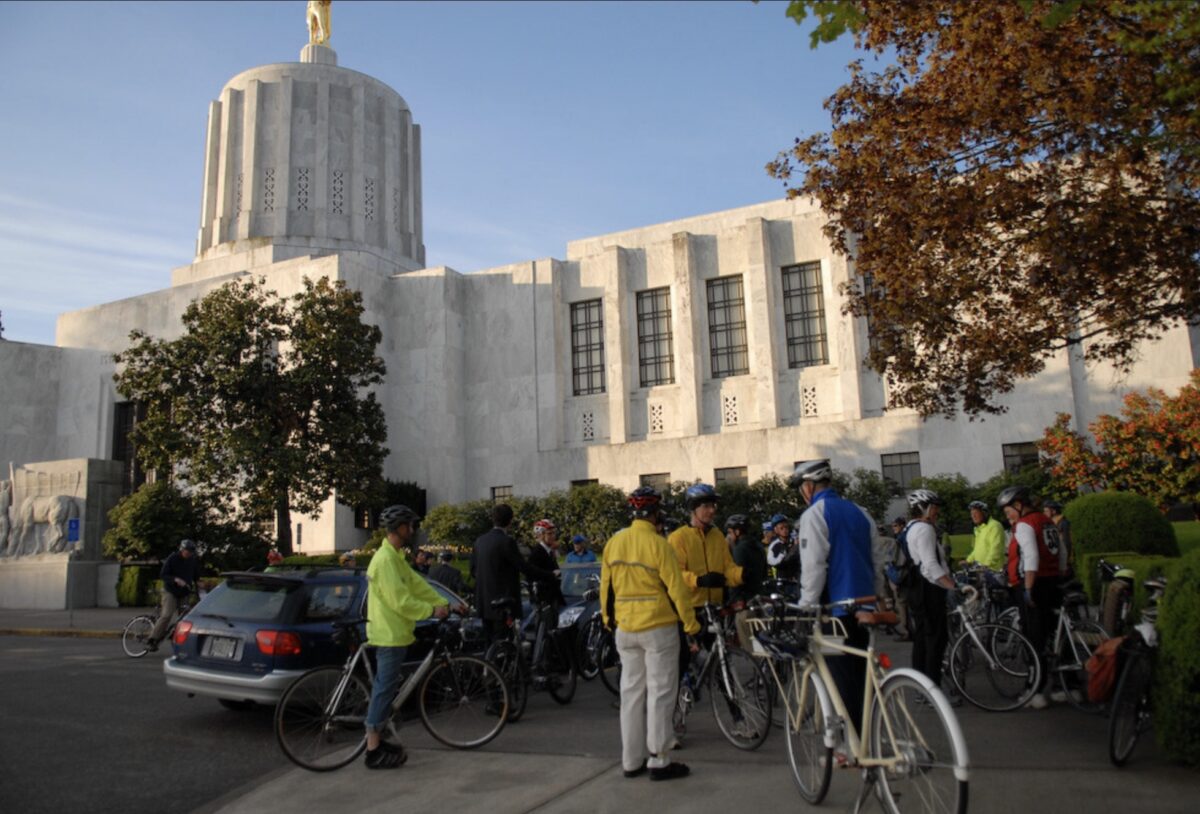
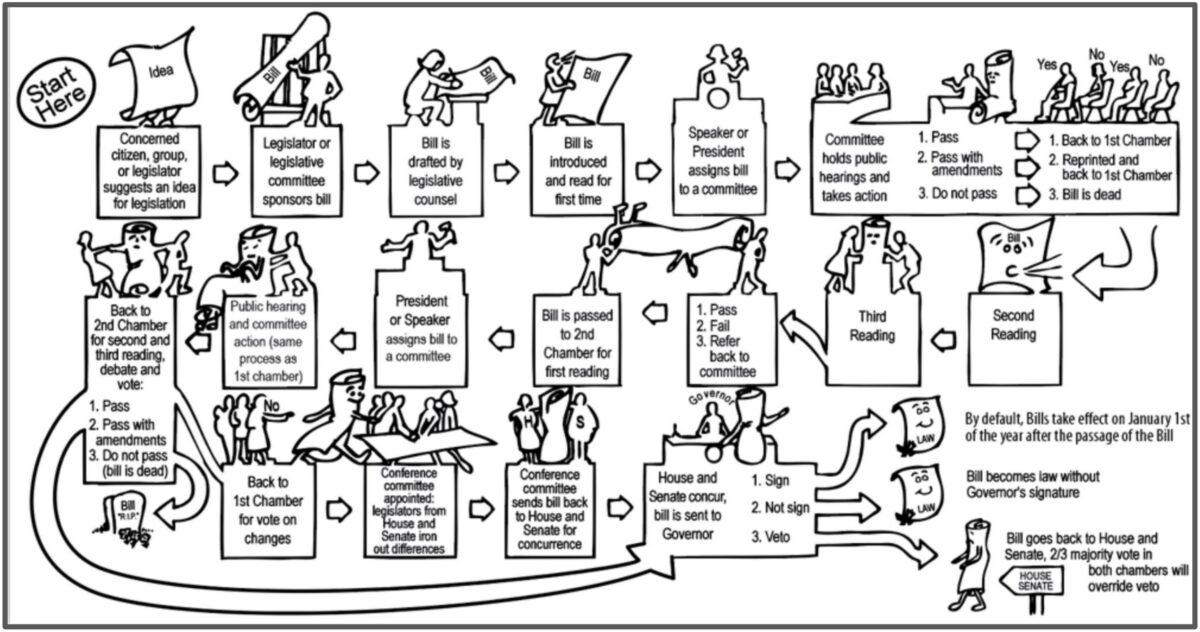
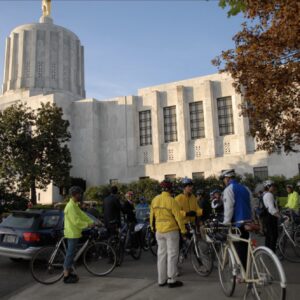
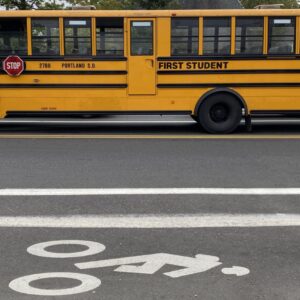

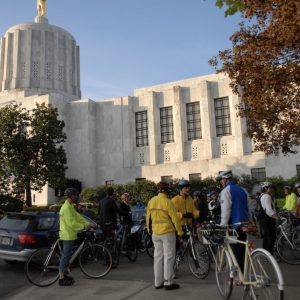
Thanks for reading.
BikePortland has served this community with independent community journalism since 2005. We rely on subscriptions from readers like you to survive. Your financial support is vital in keeping this valuable resource alive and well.
Please subscribe today to strengthen and expand our work.
RE: SB 598 Powell Jurisdictional Transfer
Think about how shameful and inadequate it is that the state’s solution to its own organization’s (ODOT’s) failure to address its constituents’ safety concerns is to give management of the street away, to remove its own responsibility for ensuring what its constituents are asking of it.
There are many good reasons jurisdictional transfer should be pursued on any given street, namely different visions of how a street should function/what it’s role in a city’s/community’s life should be. But at the very least, the foundation of each of those visions should be a street that is safe, whether focused on moving cars or making places for people; achieving that should be the price of admission, no matter which vision you’re pursuing.
Instead of the state requiring their Department of Transportation to change its approach—to better balance efficacious movement with safety, to be more responsive to its constituents—the state is going to continue to give away responsibility for addressing the most problematic parts of the network. ORLeg, how about holding ODOT (and yourselves!) accountable—requiring it change its priorities and the way it pursues them (and funding it thus!)—rather than letting it off the hook for its worst failures and leaving it the poorly calibrated organization it is?
I’d love to take a WES train to Salem’s waterfront or Salem’s Amtrak station.
I believe that David Samuel Hill the guy who is trying to repeal the Idaho stop law is the same person as the David Samuel Hill who is the leader of the Oregon chapter of the violent anti government organization the three percenters. Not sure why they are pro government intervention in this one narrow case but also probably not worth wasting one’s breath trying to use logic to change their mind…
“Keep your government mitts off my Medicare, Bjorn!” 😉
First of all, thanks for doing these roundups. It’s super helpful for those of us whose “local” paper is a USA Today affiliate, where the legislative reporting tends to be brief, superficial, and post facto.
But more urgently, boo to Senator Prozanski. On top of the parking reform, Climate Friendly Communities mandated mixed use zoning districts that don’t currently exist in most Oregon cities outside Portland. From my reading, his bill is just as likely to kill Climate Friendly Communities as delay it, since it requires 80% of jurisdictions affected by revised rules to approve them. I’ve never heard of this kind of approval rule for any regulation or legislation anywhere, probably because it would prevent it from going forward. I’ve written Sen Prozanski to express my deep disappointment in his anti-environment, anti-equity, anti-urban bill, and I encourage others to do the same.
The CFEC rules are about improving active transportation and limiting auto-oriented planning as much as they are about parking and land use. The adopted rules would require that cities use NACTO standards to plan for future bike and pedestrian systems.
https://www.oregon.gov/lcd/CL/Documents/TPR_2022.pdf#page=56
Yes! That was another thing I was excited about: since my city (Eugene)’s TSP is utterly arbitrary and the city tends to struggle to begin & complete big projects, I saw the TSP revision requirement as a big positive. Honestly I feel a bit betrayed by Senator Prozanski since he has postured as a transportation & climate progressive, but he and the rest of the Eugene delegation seem to be anti-urban so maybe this shouldn’t be a surprise.
Thanks again for a great, informative article Bike Portland!
WES to Salem will only be useful if they cough up the money for a ~4 mile tunnel from Beaverton to Montgomery Park and extend service to Union Station and Gateway. That would create a backbone for a proper regional rail system. The N-S route could ultimately serve HSR too.
Yikes! – that tunnel would cost billion$$$. I’m not saying the concept is a bad one. Wouldn’t it be cheaper to put a train along the current I-5 right of way? That’s actually where several train lines ran before the lines closed and I-5 was built over them.